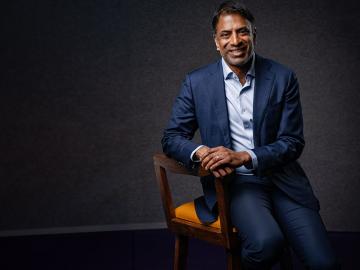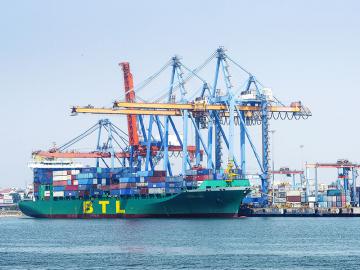
Murthy: What it Takes to Run the Marathon
As the founders of Infosys approach the age of retirement, they must hand over charge to a new generation of leaders. R Narayana Murthy discusses his plans with Forbes India
On the leadership challenges facing founder-led companies like Infosys
The best index of success of an organisation is its longevity. I have tremendous respect for IBM, GE and Philips of the world. If you have demonstrated longevity then you have gone through difficult days and made sacrifices. You have controlled costs and essentially you have built up character — it helps you to survive difficult days. For one organisation to demonstrate longevity, it has to regenerate the leadership layer periodically.
This is a huge challenge for all corporations, and not every leader has the energy to run this huge marathon. I have seen people who have discontinued the marathon at Infosys. They were extraordinary people at a certain age, [had] great energy and passion, but time is a great leveller. It is difficult to say whether it is five,10 or 15 years…
It is an acid test for a very important reason. For the founders there are two reasons why they will make serious adjustments. One, they have succeeded in one dimension which is money. Second, it is their child and it is easy to make any adjustments, whereas if you are not a mother it is not that easy. It is an easier task for a founder turned CEO in some ways. I can give any theory, but it has no value, because I don’t have any data…
When there is an extraordinary individual within the company it is very important to give that individual an opportunity after ascertaining that the individual can deliver.
So you have to give opportunity to internal people and have to evaluate them before going outside. It should not be a fashion to go outside. There is so much of organisational memory here and so much of institutional memory and culture here and it is very important.
Look at Philips or Unilever, just to give two examples. I don’t know about India, somehow my focus is not on India so it is difficult to comment, but on the international scene I think there are enough examples. Take Lafarge, the number two cement company in the world. I serve on their advisory board. It was founded and then the founders held shares till a few years ago. Now they don’t even hold any shares there.
The problem could be if we select somebody who is new to the culture of Infosys, who is not willing to make the kind of adjustments that the CEOs so far could have made. It is not founder or non-founder. It is whether the person has the attribute such a large company [needs] and whether he is generous [enough] to make adjustments etc.
On relationship with and role of independent directors
None of us will insist on our views prevailing, because this is an organisation which was founded on the basis of discussion and debate. I keep telling people that this is the world’s greatest debating society. As long as you use data and argument and as long as your data is better than mine, we accept your point. It is the data and the facts that you bring to the table.
Our independent directors are extremely capable people and are very open minded. Right now, Jeff Lehman is the chairman of the Nominations committee. Jeff was the dean of the law school of Michigan. He is an extraordinary fellow. My personal feeling is that if we put up proper data and facts they generally value it. So I have no worry on that account.
After August 20, 2011, I have no role. We are free to leave the company between 57 and 60. At 60 we have to leave, unless we become non-exceutive directors. My colleagues were kind to me and wanted me to continue but it will not be the case with everyone. For example, Mr Ragahavan didn’t continue after 57. So if the independent directors were to request anyone to continue beyond 60 they will continue, otherwise all these people they must leave in five-six years.
On the recent induction of ICICI Bank’s K.V. Kamath into the board
I have known K.V. for 38 years when he just finished his MBA at IIM-A. I have seen him play cricket. I worked with him; I was on the board of ICICI. He is one the real leaders who created a vision of ICICI Bank — the universal bank. It was on the drawing board the white board and he implemented it. That’s a rare quality, that’s more than what most people can think of.
Remember, Claude Smadja is leaving the board in 2010 and I and Marti [G. Subrahmanyam] are leaving the board [by] 2011. Then most probably Deepak [M. Satwalekar] is leaving in 2012-2013, Rama [Bijapurkar] is leaving, Omkar [Goswami] is leaving. They are all completing nine years. And if they continue after nine years they will not be considered independent directors. So we want independent directors, we have enough internal directors. We need 50 percent independent directors. Kamath also will retire in 2012 when he reaches [the age of] 65. He has had good experience in transitioning and that will come in handy.
On Infosys’ transition plan
To be very honest, I thought about it when I founded Infosys. When Infosys was founded in 1981, five of the seven were 10 years younger to me. I deliberately chose them, Mr [N.S.] Raghavan was three years elder to me but Nandan [Nilekani], Kris [S. Gopalakrishnan], Shibu [S.D. Shibulal], Ashok Arora were 10-11 years younger than me. The reason I chose them was that I have tremendous faith in the youngsters. I’ve always believed that youth is about future, confidence and enthusiasm, energy, etc, etc. Second, I knew that the only way this institute can continue to prosper is if there are younger people who can get the opportunity when they are still younger, energetic, healthy and enthusiastic. I had in my mind, right from the very beginning that one or two of those should get the opportunity to lead the company before I disappear from the scene. There was some method in the madness and it worked out according to the plan.
After I decided to give up my ambition in 1998 August, before we went public on Nasdaq, I started thinking about an instrument for developing the next generation for leaders. That’s when we started thinking of starting the ILI [Infosys Leadership Institute] and creating the platform where we could train our next, next, next generation of leaders. I discussed with my colleagues and we sent our younger leaders to study eight models of leadership including GE, Motorola and we finally started ILI in 2001. I got Dr. G.K. Jayaram to lead ILI.
That’s on the side of formal training but I also realised that parallel we have to create a mechanism for giving people an opportunity to take leadership positions. That’s how Raghavan and Kris at that time came out with the concept of strategic business units which then metamorphosed into IBUs [Independent Business Units] and they talked about the need for each IBU to be run as an autonomous wholesome unit which consisted of software, sales, HR people, etc. Before 2002, we had a model where sales reported to Phaneesh [Murthy] and people realised that model would not provide an opportunity to demonstrate the leadership potential. In 2002-2003 we moved over to the new IBU model.
Tier 1 – 45 leaders, Tier 2 – 125 and Tier 3 – 405… the idea is that three people at a certain level for one person at the higher level.
The Institute was based on three fundamental tenets: Our company is our campus, our business is our curriculum — that means leadership is always in a context, the Infosys business context is the curriculum — and I said our leaders must be our teachers, we must depend very little on outsiders on developing our leaders. The reason was that when the attendees come and attend our course, when you make statements in the training programme if it has to have credibility and authority those statements must be supported by facts and data concerning the context of Infosys.
At infosys there were five younger people at [the] level next to me, all of whom were the same age. We had to make an implicit decision — it is not written anywhere — that after five years you step back [as CEO] and give the other person a chance. You support him, you work as hard as before, you come to office, but let the searchlight fall on the other person. The good thing about Infosys is that because the founders made lots of money, in one dimension they have arrived, they don’t have to prove anything to anyone. So it’s easy for the founders after five years to say, ‘OK, I am done’ and give it up. We have yet to see whether that model will work later. I was CEO for 21 years and I am the wrong person to advice. But at this point itself, given that in the board itself there are five more people — there’s Shibu [S.D. Shibulal], Mohan [Mohandas Pai], [K.] Dinesh and Srinath [Batni] — all of whom are competent. We don’t [know] which one of them will become CEO. That is a decision for the external board to take. But again it’s very, very likely that it will be again for five years. Mohan is 50 and Shibu and Kris are 54, so it is very likely that it will again be five years.
On mentoring
Mentoring is a voluntary relationship, and the mentee has to ask for time from me, I will never ask them to do that. The mentor is not the boss, I am there to provide the distilled wisdom on any issue they want. They ask definitely once a month and most of the issues we discuss are [about] their career growth, the tough decisions they have to take whether in giving up a big opportunity because the prospect is being unreasonable about prices or dealing with a recalcitrant employee or balancing home and office. It is mostly the dilemmas that they talk about. I just tell them whatever my experience has been. I will not ask for their time, they have to ask me for it.
On leadership
You need leaders who are courageous because you need leaders to dream big, you need courage of conviction, you need courage to take bold steps when there are so many naysayers. Second, you must have high learnability because you have to take decisions quickly (snaps his fingers). Third, you must be able to communicate reasonably well, because leadership is all about creating a wonderful image of [the] future of the company and unless you can communicate reasonably well, you cannot rally, get behind people. Third, you must have a good value system and you must lead by example, because without [a] value system people won’t buy your dream. Leaders must be confident, which is the ability to admit I could be wrong, it is the ability to recruit someone smarter than me, it is the ability to participate in team work. Leaders must be human, in other words they must show emotions and not hide mistakes, they must not seem synthetic or flawless.
On the business challenges for the new leaders
As it is, about 50 percent of our revenues are coming from services which we did not have 10 years ago. That’s one change that has already taken place and continues to take place. Second, we will perforce be bringing certain changes in the model. So far, by and large the global delivery model at Infosys has leveraged the Indian talent both in India and outside. Because of all the regulatory changes coming out in the US and other countries we will be depending more and more on local talent. That is the other change we will see. We have our banking products and who knows we may have some more products like that as we move forward. Right now we don’t have anything on the table, though we have quite a few in the laboratory. Today about 30 percent of our workforce is out of India, that has to become local in the stable scenario. Today there are only 1,500 locals, i.e., the citizens and local residents of those countries. That has to change to 30,000 in the next three-five years. That is the only stable model in my opinion. You can’t run a business worrying about regulatory changes. You should simply accept that as a given and move forward.
-
 Omman
OmmanIt is all well but whether Mr.Murthy will remember his old days when he was unable to pay the bills he spent for his girl friend (later he got married to her). While sacking 2500 engineers / employees from Infosys he should have considered their future. They have treated them as non-performance. Why they have been kept for 2/3 years. Now they are unable to get job anywhere due to certificate awarded them with the remarks of "non-performence". Can everyone become an IITian. Mr.Murthy once said no employees of Infosys will be sacked. what happened to his words.
on Jun 26, 2009 -
 outsourcerer
outsourcererIt's interesting to note how NRN talks about Infosys being one of the world's biggest debating societies.<br /> <br /> It's obvious he doesn't mix much with the rank and file; how many people have the guts to question their bosses in Infosys in this day and age? <br /> <br /> Very few.<br /> <br /> It's all very well to project an image but Forbes should have at least tried to talk to a cross section of the employees, vendors and customers of Infosys to get a 360 degree view of the situation instead of just depending on the public utterances of three board members to publish the story.
on Jun 16, 2009 -
 nishant jain
nishant jainVery interesting article. It inspires so much. All the founders of Infosys have the vision to make this company a very powerful one.
on Jun 9, 2009














